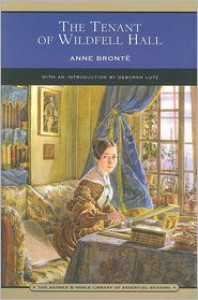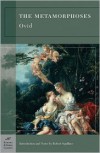With a dreamy, far off look...
...and her nose stuck in a book.
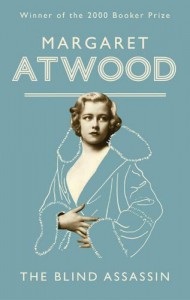 The Blind Assassin is nothing short of a remarkable feat for any writer, but because this was written by Margaret Atwood, it is almost expected of her. Only one who has mastered the craft of writing would be able to weave the four narratives presented without some tangles and tears in the way. The two narratives of Iris in the present and Iris writing the past are conventional enough, but Atwood also includes the novel within the novel, The Blind Assassin, with its own distinct style, with its own story within a story as pure early twentieth century science fiction. A book with this many elements should be terribly pretentious, let alone downright terrible, but it's not. Even those who are not fans of Atwood would be impressed.
The Blind Assassin is nothing short of a remarkable feat for any writer, but because this was written by Margaret Atwood, it is almost expected of her. Only one who has mastered the craft of writing would be able to weave the four narratives presented without some tangles and tears in the way. The two narratives of Iris in the present and Iris writing the past are conventional enough, but Atwood also includes the novel within the novel, The Blind Assassin, with its own distinct style, with its own story within a story as pure early twentieth century science fiction. A book with this many elements should be terribly pretentious, let alone downright terrible, but it's not. Even those who are not fans of Atwood would be impressed. While reading The Blind Assassin, I found a dull sadness growing within me, and now that I've finished I'm left with an ache. Our protagonist, Iris Chase Griffen, makes it clear that she does not want to be viewed as a heroine or a tragic figure, but despite this the reader cannot help but feel for her. Trapped in an arranged marriage that ended up being a scam on her family, Iris is manipulated by her husband and sister-in-law into being a non-entity in regards to her own life and her younger sister's. Her daughter wanted no relationship with her, and thus Iris has no relationship with her granddaughter Sabrina, which is all she yearns for now that all else is gone. But the ache of sadness comes from the guilt and regret about how Laura's life turned out--how she felt powerless to protect her, how she never realized Richard was molesting her, how she could not bring her back to life, that they both lost the lover they shared, and how she can never convey nor make up for the sorrow she feels. It may not be the most gripping novel in the world, but I won't regret reading it.
 When I was in college I read this partially out of morbid curiosity, and partially because at the time I was working retail and several customers would tell me "OMG YOU ARE JUST LIKE BELLA FROM TWILIGHT!!" so I wanted to see if this was a compliment. Basically, the only traits I share with Meyer's main character Bella Swan is that we are both pale white girls with brown hair and eyes, who are also hopeless at sports. That's it. That's also the entire characterization of Bella, which is odd considering she is THE MAIN CHARACTER, so she should have dimension. Perhaps Meyer did this intentionally, so that her (female) readers could place their own personalities on Bella and feel that they themselves are part of the story, but I severely doubt it since it seems that Meyer just threw a dart at her thesaurus when she could not think of an adjective to use instead of actually caring about the craft of her writing. Anyway, not only does Bella lack dimension, but she also never seems to do anything other than date an abusive vampire, Edward, despite him insisting that he is dangerous and will abuse her. So considering this, I have decided that those women back at that job must have been telling me that I look like Kristen Stewert, who actually has a personality and does things, or were insulting me.
When I was in college I read this partially out of morbid curiosity, and partially because at the time I was working retail and several customers would tell me "OMG YOU ARE JUST LIKE BELLA FROM TWILIGHT!!" so I wanted to see if this was a compliment. Basically, the only traits I share with Meyer's main character Bella Swan is that we are both pale white girls with brown hair and eyes, who are also hopeless at sports. That's it. That's also the entire characterization of Bella, which is odd considering she is THE MAIN CHARACTER, so she should have dimension. Perhaps Meyer did this intentionally, so that her (female) readers could place their own personalities on Bella and feel that they themselves are part of the story, but I severely doubt it since it seems that Meyer just threw a dart at her thesaurus when she could not think of an adjective to use instead of actually caring about the craft of her writing. Anyway, not only does Bella lack dimension, but she also never seems to do anything other than date an abusive vampire, Edward, despite him insisting that he is dangerous and will abuse her. So considering this, I have decided that those women back at that job must have been telling me that I look like Kristen Stewert, who actually has a personality and does things, or were insulting me.Now the main reason I rated this one star was not because of the lack of characterization or terrible writing. This book is rated so low because I frankly had no interest in any of the characters or the plot, and boy did I try to care, but only finished out of the hope that somehow I would understand why so many people are completely enamored with this series that is essentially a glorification of an abusive relationship. I guess those people either don't understand that Edward constantly controlling Bella (which I have heard gets worse in the subsequent novels) and admitting that he wants to kill her is incredibly problematic, or they find the terribleness of it all amusing.
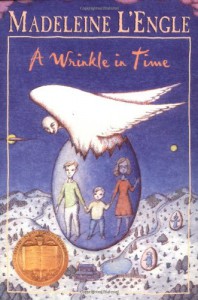 A Wrinkle in Time by Madeleine L'Engle is my favorite book. It's been over ten years since I have first read the novel, and it has taken me this long to be able to articulate what it means to me. For it was not just L'Engle's wonderful, imaginative story that captivated me, but the relationship between Meg and her younger brother Charles Wallace. When twelve year old me read this on my Poppop's boat during a hot summer day, it was years before my brother was diagnosed with Asperger's Syndrome, and this was the first time I encountered a person like him, Charles Wallace. By the time he was introduced, Meg already seemed more relatable to me than any other character I have read before, even though I was hopeless with arithmetic. Every time I reread A Wrinkle in Time I cannot help but smile at every one of these siblings' interactions, because it always takes me back to the first time when I thought, "Oh my God, this author knows what it's like to be me."
A Wrinkle in Time by Madeleine L'Engle is my favorite book. It's been over ten years since I have first read the novel, and it has taken me this long to be able to articulate what it means to me. For it was not just L'Engle's wonderful, imaginative story that captivated me, but the relationship between Meg and her younger brother Charles Wallace. When twelve year old me read this on my Poppop's boat during a hot summer day, it was years before my brother was diagnosed with Asperger's Syndrome, and this was the first time I encountered a person like him, Charles Wallace. By the time he was introduced, Meg already seemed more relatable to me than any other character I have read before, even though I was hopeless with arithmetic. Every time I reread A Wrinkle in Time I cannot help but smile at every one of these siblings' interactions, because it always takes me back to the first time when I thought, "Oh my God, this author knows what it's like to be me." Helen Castor begins this book with the death of King Edward VI, and how for the first time in England's history, all the possible heirs to the throne were female; his sisters Mary and Elizabeth Tudor, as well as his personal pick, Jane Grey. However, this was the not the first time in history that a woman ruled England, as Castor demonstrates by providing a narrative account of four former queens of England. The lives of Empress Matilda, Eleanor of Aquitaine, Isabella of France, and Margaret of Anjou are chronicled in this work, all of whom were able to rule in place of their sons who were either too young, off fighting a crusade, or in the place of physically or mentally absent husbands.
Helen Castor begins this book with the death of King Edward VI, and how for the first time in England's history, all the possible heirs to the throne were female; his sisters Mary and Elizabeth Tudor, as well as his personal pick, Jane Grey. However, this was the not the first time in history that a woman ruled England, as Castor demonstrates by providing a narrative account of four former queens of England. The lives of Empress Matilda, Eleanor of Aquitaine, Isabella of France, and Margaret of Anjou are chronicled in this work, all of whom were able to rule in place of their sons who were either too young, off fighting a crusade, or in the place of physically or mentally absent husbands. This rating is really a 4.5, only because Castor tends to discuss the men around the women at times more than the actual women she is chronicling. However, I know that this is due to the unfortunate fact that the surviving sources are about the the men around the women, rather than the women themselves. For example, there is no surviving account which discusses what Empress Matilda's personality was like, even though she was once the Empress of the Holy Roman Empire and later the Queen of England, so Castor had no choice but to extrapolate what she could from the information available. Despite this, I found that Castor did an excellent job of crafting each of these women as the three dimensional people they were rather than rehash the one-note ideas found in the sources. I also enjoyed how she was able to connect each of these women to one other (including Mary, Elizabeth, and Jane Grey) by more than their bloodlines. You might not see the parallels while studying each woman individually, but by placing their histories next to each other you can, and Castor will show you them. I appreciated that Castor looked at each woman objectively, rather than vilify them for their actions (such as Eleanor abandoning her children from her first marriage or Isabella taking on a lover) as some authors are prone to. This was especially evident considering her book opens and closes with Elizabeth I becoming the Queen of England. Nearly every account I've read about Elizabeth writes her elder sister Mary as a bitter, vengeful crusader. Yet Castor illustrates that Mary is just as human as everyone else, which was so much more refreshing than another Bloody Mary rehash.
While She-Wolves: The Women Who Ruled England Before Elizabeth by Helen Castor may not be as expansive about each woman as one hopes, this book does present a clear, concise, and human chronicle about these Queens of England, and you will be presented with a more in depth history than our remaining historical sources can give us.
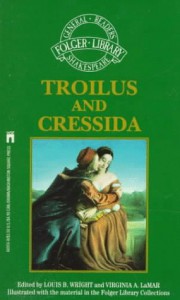 Now I understand why Troilus and Cressida is considered one of the problem plays. There is no hero nor herione of the story, and there is no antagonist either. This play does not adhere to the typical genres of Shakespeare (tragedy, comedy, or history) as well. I suppose it is closest to a tragedy in that Troilus and Cressida do not end up together, however this is one of the aspects of the play that I enjoyed most, besides the being a retelling of a snippet of the Iliad and Thersites' amazing insults of course. Shakespeare makes it clear that Troilus is far more in love with his idea of Cressida being a romantic, Penelope-like figure hopelessly devoted to him, than Cressida herself. Cressida seems like a normal teenage girl, getting a crush on one guy for a month then another the next--very much unlike Troilus' idea that a woman must love only one man for her entire life. The audience sees that Troilus is just a crush to Cressida, but Troilus cannot, so when he spies on her agreeing to sleep with her now-husband Diomedes, he is understandably angered and heartbroken. Troilus vows revenge on Diomedes and Cressida, but the play ends before we can see if ever achieves it. While Troilus and Cressida is not among my favorite of Shakespeare's plays, I find that its problems are what makes the play interesting.
Now I understand why Troilus and Cressida is considered one of the problem plays. There is no hero nor herione of the story, and there is no antagonist either. This play does not adhere to the typical genres of Shakespeare (tragedy, comedy, or history) as well. I suppose it is closest to a tragedy in that Troilus and Cressida do not end up together, however this is one of the aspects of the play that I enjoyed most, besides the being a retelling of a snippet of the Iliad and Thersites' amazing insults of course. Shakespeare makes it clear that Troilus is far more in love with his idea of Cressida being a romantic, Penelope-like figure hopelessly devoted to him, than Cressida herself. Cressida seems like a normal teenage girl, getting a crush on one guy for a month then another the next--very much unlike Troilus' idea that a woman must love only one man for her entire life. The audience sees that Troilus is just a crush to Cressida, but Troilus cannot, so when he spies on her agreeing to sleep with her now-husband Diomedes, he is understandably angered and heartbroken. Troilus vows revenge on Diomedes and Cressida, but the play ends before we can see if ever achieves it. While Troilus and Cressida is not among my favorite of Shakespeare's plays, I find that its problems are what makes the play interesting.
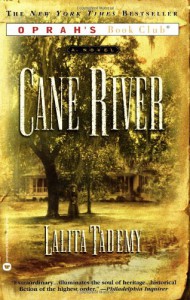 While I found it interesting that Tademy based this on her own family history, sixteen year old me was not pleased to read about how the women in her family were being raped by older white men generation after generation. Sure, I liked the main characters, especially Philomene, and was well aware that these were completely viable situations that the four women could have went through. Perhaps if I had read this now instead of in high school, I might have been able to appreciate Cane River more, and wouldn't have considered reading it as a punishment.
While I found it interesting that Tademy based this on her own family history, sixteen year old me was not pleased to read about how the women in her family were being raped by older white men generation after generation. Sure, I liked the main characters, especially Philomene, and was well aware that these were completely viable situations that the four women could have went through. Perhaps if I had read this now instead of in high school, I might have been able to appreciate Cane River more, and wouldn't have considered reading it as a punishment.
 As always, L'Engle achieves the task of explaining scientific and cosmic theories to her audience of children & adolescents without talking down to them. And this time without a character quoting the Bible every chapter. While I'm fairly certain that her ideas about symbiotic mitochondria are off (I haven't taken a biology course in ten years), she is correct about your body being a galaxy for its cells. I also loved her idea of kything, and am totally using it as a euphemism for sex. Despite all that I liked about A Wind in the Door, I'm sorry to say that the new supporting characters, aside from Proginoskes, just didn't measure up to the three Mrs. and Aunt Beast. But then again, they probably weren't meant to.
As always, L'Engle achieves the task of explaining scientific and cosmic theories to her audience of children & adolescents without talking down to them. And this time without a character quoting the Bible every chapter. While I'm fairly certain that her ideas about symbiotic mitochondria are off (I haven't taken a biology course in ten years), she is correct about your body being a galaxy for its cells. I also loved her idea of kything, and am totally using it as a euphemism for sex. Despite all that I liked about A Wind in the Door, I'm sorry to say that the new supporting characters, aside from Proginoskes, just didn't measure up to the three Mrs. and Aunt Beast. But then again, they probably weren't meant to.
 The Hobbit was intentionally written as a children's book, and because of this Tolkien refrains from adding tedious descriptions of such details as what the grass is like as our group of adventurers march along he is fond of in his works for adults. Really, such descriptions are not needed as Tolkien does a magnificent job of transporting the reader into Middle Earth, without dumbing things down for his audience of children. For example, Tolkien briefly describes the personalities of all of the creatures encountered in The Hobbit as if he was a gentle parent reading to his own child, rather than a condescending teacher to a group of students. Because of this style of narration, I find that the older I get, the more I appreciate Tolkien's skill as a writer. It is one thing to be a great author, but another to be a great author of different styles of writing. Plot-wise, I enjoyed the episodic nature of The Hobbit because while each chapter was entertaining, every reader will have different favorite adventures from the next (mine are the unexpected dwarf party, meeting Gollum, and crossing the river in Mirkwood). The only reason I am giving this 4.5 out of 5 stars is that I wish we got to know more of the dwarves, and that evidently in Middle Earth men outnumber women 8 to 1, so there was no room for female characters in The Hobbit!
The Hobbit was intentionally written as a children's book, and because of this Tolkien refrains from adding tedious descriptions of such details as what the grass is like as our group of adventurers march along he is fond of in his works for adults. Really, such descriptions are not needed as Tolkien does a magnificent job of transporting the reader into Middle Earth, without dumbing things down for his audience of children. For example, Tolkien briefly describes the personalities of all of the creatures encountered in The Hobbit as if he was a gentle parent reading to his own child, rather than a condescending teacher to a group of students. Because of this style of narration, I find that the older I get, the more I appreciate Tolkien's skill as a writer. It is one thing to be a great author, but another to be a great author of different styles of writing. Plot-wise, I enjoyed the episodic nature of The Hobbit because while each chapter was entertaining, every reader will have different favorite adventures from the next (mine are the unexpected dwarf party, meeting Gollum, and crossing the river in Mirkwood). The only reason I am giving this 4.5 out of 5 stars is that I wish we got to know more of the dwarves, and that evidently in Middle Earth men outnumber women 8 to 1, so there was no room for female characters in The Hobbit!
 Good and Bad Characters according to Ayn Rand, Champion of Individualism:
Good and Bad Characters according to Ayn Rand, Champion of Individualism:A good character shares beliefs with Ayn Rand. A bad character does not share beliefs with Ayn Rand. This is quite annoying considering that Rand has been renowned for her supposed belief in individualism. But Ayn Rand will not deal with actual individuals, because she only likes people who are exactly, unshakably like her.
 This was an easy, entertaining read. As someone who also from Delaware County, Pennsylvania I loved whenever Fey would reference the area. I also appreciated her love letters to Amy Poehler and the window she gave us into what being a writer for SNL is like, since we usually only hear about the performing aspect of the show. The reason why I am giving this book three stars is because there are times when it feels like Tina Fey is trying too hard to make sure that her book meets the funny-expectation by adding jokes that aren't needed. Often her stories are funny enough without the extra joke. With all that said, I did enjoy this book and I feel that those who enjoy Fey's comedy will enjoy it as well.
This was an easy, entertaining read. As someone who also from Delaware County, Pennsylvania I loved whenever Fey would reference the area. I also appreciated her love letters to Amy Poehler and the window she gave us into what being a writer for SNL is like, since we usually only hear about the performing aspect of the show. The reason why I am giving this book three stars is because there are times when it feels like Tina Fey is trying too hard to make sure that her book meets the funny-expectation by adding jokes that aren't needed. Often her stories are funny enough without the extra joke. With all that said, I did enjoy this book and I feel that those who enjoy Fey's comedy will enjoy it as well.



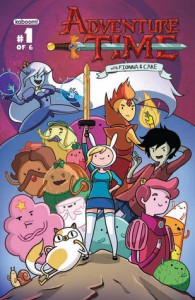
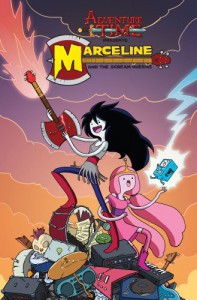
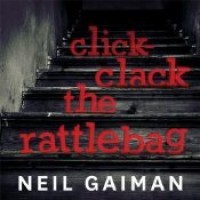
 1
1
